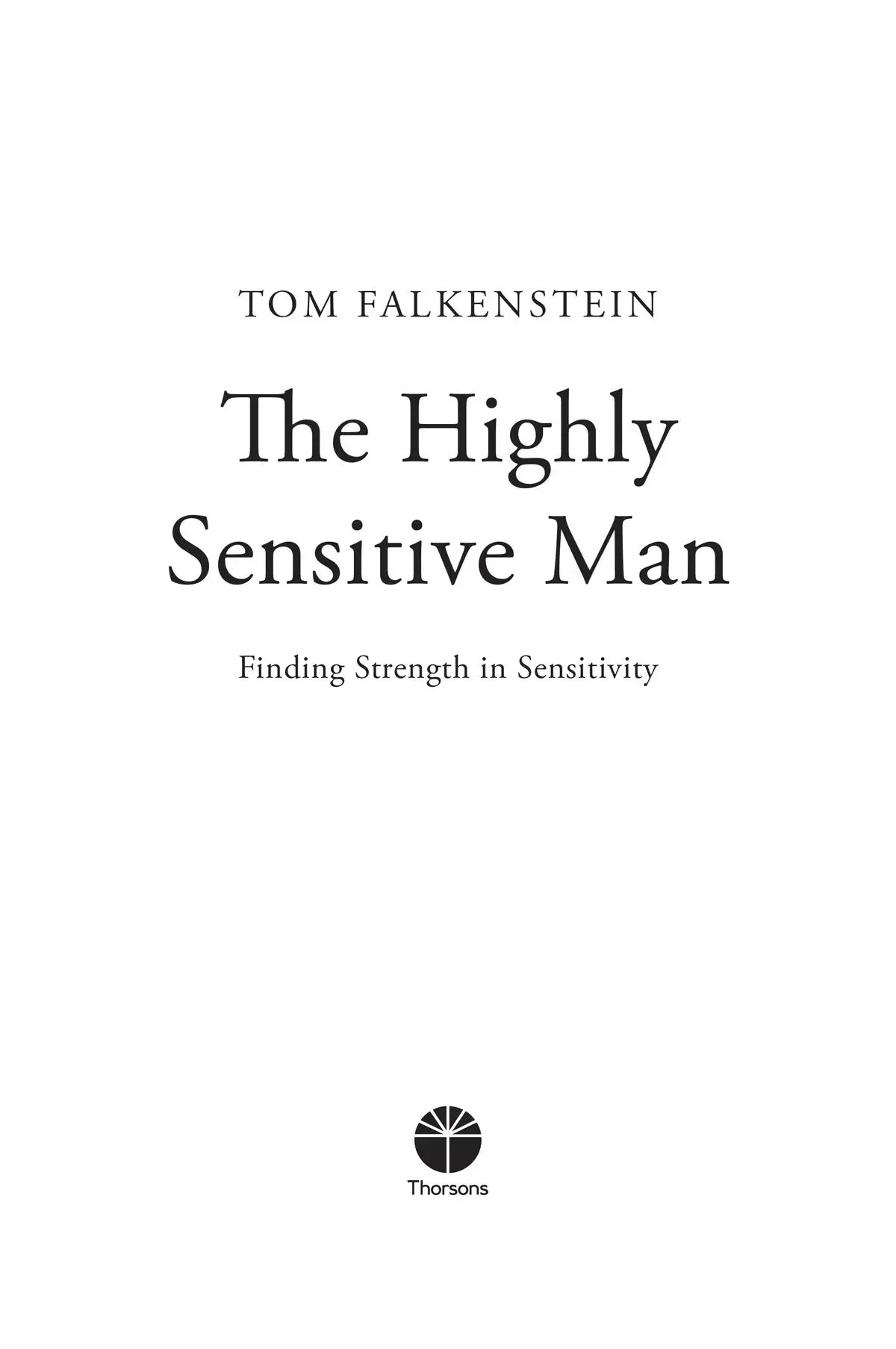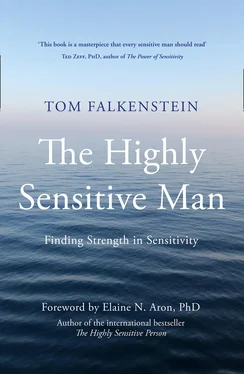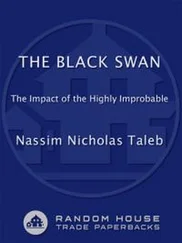
Copyright Copyright Dedication Epigraph Foreword by Elaine Aron Introduction PART 1: THE PHENOMENON OF HIGH SENSITIVITY 1. A Turning Point in Masculinity: The Importance of Highly Sensitive Men in Society 2. Understanding High Sensitivity: The Scientific Background and Why People Differ in Their Innate Sensitivity 3. Identifying High Sensitivity: Am I Highly Sensitive? 4. Everyday Effects of High Sensitivity and How It Differs from Psychological Disorders PART 2: LIVING (WELL) AS A HIGHLY SENSITIVE MAN 5. Strategies to Deal With Overstimulation and Intense Emotions: What Emotional Regulation Is and Why It Matters for Highly Sensitive Men 6. Strategies to Deal With Overstimulation and Intense Emotions: Mindfulness and Acceptance 7. Strategies to Deal With Overstimulation and Intense Emotions: Relaxation and Imagery Exercises 8. Your Relationship with Yourself: How Do You Relate to Your High Sensitivity? 9. Self-Worth and Self-Care for Highly Sensitive Men 10. Conclusions Appendix: A Conversation with Elaine Aron About Highly Sensitive Men Endnotes Acknowledgments List of Searchable Terms Praise About the Author About the Publisher
The reader is advised that this book is not intended to be a substitute for an assessment by, and advice from, an appropriate medical professional(s). This book contains general information regarding high sensitivity and should be viewed as purely educational in nature.
Thorsons
An imprint of HarperCollins Publishers
1 London Bridge Street
London SE1 9GF
www.harpercollins.co.uk
German language edition © 2017 by Junfermann Verlag.
English translation by Ben Fergusson.
This translation published by arrangement with Agence Schweiger.
English language edition first published in the US by Citadel Press Books, Kensington Publishing Corp. 2019
This Thorsons edition published 2019
FIRST EDITION
© Tom Falkenstein 2019
Cover layout design © HarperCollins Publishers Ltd 2019
Cover photograph © Fernando Jorge/Unsplash
A catalogue record of this book is available from the British Library
Tom Falkenstein asserts the moral right to be identified as the author of this work
All rights reserved under International and Pan-American Copyright Conventions. By payment of the required fees, you have been granted the nonexclusive, non-transferable right to access and read the text of this e-book on screen. No part of this text may be reproduced, transmitted, downloaded, decompiled, reverse engineered, or stored in or introduced into any information storage retrieval system, in any form or by any means, whether electronic or mechanical, now known or hereinafter invented, without the express written permission of HarperCollins e-books.
Find out about HarperCollins and the environment at www.harpercollins.co.uk/green
Source ISBN: 9780008366445
Ebook Edition © September 2019 ISBN: 9780008366452
Version 2019-08-19
Contents
Cover
Title Page
Copyright
Dedication
Epigraph
Foreword by Elaine Aron
Introduction
PART 1: THE PHENOMENON OF HIGH SENSITIVITY
1. A Turning Point in Masculinity: The Importance of Highly Sensitive Men in Society
2. Understanding High Sensitivity: The Scientific Background and Why People Differ in Their Innate Sensitivity
3. Identifying High Sensitivity: Am I Highly Sensitive?
4. Everyday Effects of High Sensitivity and How It Differs from Psychological Disorders
PART 2: LIVING (WELL) AS A HIGHLY SENSITIVE MAN
5. Strategies to Deal With Overstimulation and Intense Emotions: What Emotional Regulation Is and Why It Matters for Highly Sensitive Men
6. Strategies to Deal With Overstimulation and Intense Emotions: Mindfulness and Acceptance
7. Strategies to Deal With Overstimulation and Intense Emotions: Relaxation and Imagery Exercises
8. Your Relationship with Yourself: How Do You Relate to Your High Sensitivity?
9. Self-Worth and Self-Care for Highly Sensitive Men
10. Conclusions
Appendix: A Conversation with Elaine Aron About Highly Sensitive Men
Endnotes
Acknowledgments
List of Searchable Terms
Praise
About the Author
About the Publisher
Dedication
For Ben and Theo
Epigraph
This excessive sensitiveness very often brings an enrichment of the personality and contributes more to its charm than to the undoing of a person’s character. Only, when difficult and unusual situations arise, the advantage frequently turns into a very great disadvantage, since calm consideration is then disturbed by untimely affects. Nothing could be more mistaken, though, than to regard this excessive sensitiveness as in itself a pathological character component. If that were really so, we should have to rate about one quarter of humanity as pathological.
A certain innate sensitiveness produces a special prehistory, a special way of experiencing infantile events, which in their turn are not without influence on the development of the child’s view of the world. Events bound up with powerful impressions can never pass off without leaving some trace on sensitive people. Some of them remain effective throughout life, and such events can have a determining influence on a person’s whole mental development.
—CARL JUNG, on particularly sensitive people, 1913
Foreword
I REALLY LIKE SENSITIVE MEN just because of those two words. First, they are men and I usually like being with men. Second, they are highly sensitive. To me, that means I can have deep conversations with them. Superficial small talk is so boring for the highly sensitive. These men have ideas. But they are also usually better listeners than the average man. They often show warmth and empathy. If you dig down, not far, you find they have a spiritual vein. They are generally ethical in their behavior and nonviolent. They are never perfect, trust me on that, but that’s good, too.
So I like that combination: sensitive man. If you are reading this, I assume that those words describe you or someone you care about. This book is about joining those two words in your mind, as a wonderful thing, just as I join them.
If you are a sensitive man, please make that leap to valuing yourself, not only for yourself but also for the rest of us. We really, really, really need you. We need you to find ways to influence the world because you have what it takes—deep ideas, the ability to find the best strategies, empathy for others, and ethics. But we want you to do it in the right way for you. And we want you to do whatever healing you need and to stay grounded in your center, to not be overstimulated. There’s no need to burn out. Nothing is helped in the long run by that. You need to keep renewing your equanimity, meaning your wisdom, and this book is a treasure trove of ways to do that.
About your author: The minute I met Tom Falkenstein in 2015 I liked him. Getting to know him just a little more, I saw that Tom had everything needed to write this book: he has a good grasp of the science behind sensitivity and enough training and experience to have a wealth of practical ideas. Above all, he is a licensed clinician, meaning, among many other things, that he can tell sensitivity from psychological disorders. Sometimes highly sensitive people are misdiagnosed and do not have a disorder. Sometimes highly sensitive people can have a disorder. And sometimes a person will want to think the only problem is sensitivity, when there is actually something else there and the person is not highly sensitive at all. Tom understands all of this and will impart that to you as well.
Читать дальше













